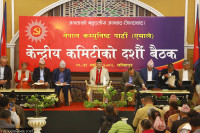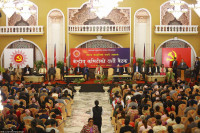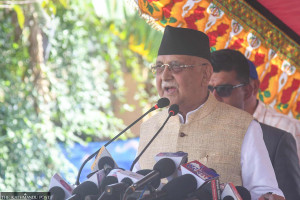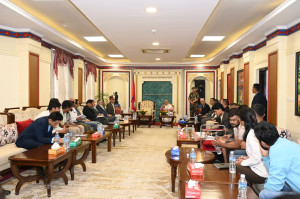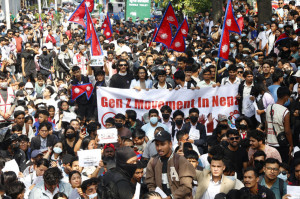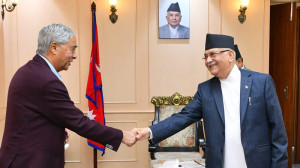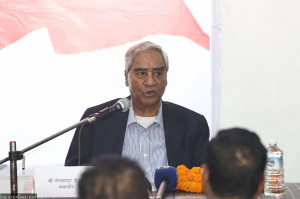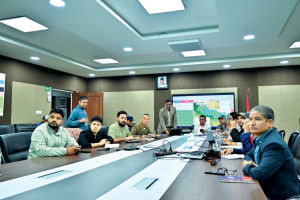Politics
Lawmakers’ ignorance of provisions in bills fuels policy corruption
Anomalies can be checked if MPs are vigilant and lawmaking is transparent: Experts
Binod Ghimire
On February 7, the Supreme Court overturned the decision of the erstwhile KP Sharma Oli government to allow the Jhapa-based Giri Bandhu Tea Estate to swap land exceeding its legal ownership ceiling with plots in any other place within the Koshi Province.
With the Supreme Court issuing its full text of the verdict on May 11, opposition party leaders have started questioning the CPN-UML about “policy corruption” committed in the process.
The Nepali Congress leaders have demanded a probe into the Oli government’s decision. Even Kathmandu Mayor Balendra Shah has joined the chorus accusing Oli, who is also the UML chairman, of illegally swapping tea estate land, citing it as a clear case of policy corruption.
The criticism from different quarters has put the UML on the defensive. And Oli is unable to hide his annoyance as questions come from all directions.
His party is now defending the decision saying that the land swap was based on an amendment to the Land Act effected through a unanimous decision of the federal parliament.
“No party opposed the Act’s amendment. The Nepali Congress also did not register any revision to the [amendment] bill. All the parties jointly passed the law,” said Yogesh Bhattarai, claiming it was wrong to accuse Oli and his party on the matter.
He went on to say that the parties that helped revise that Act were now pointing fingers at the UML as the revision had been made without their notice.
Against his claim, the Nepali Congress had registered amendments to the bill. Some of its lawmakers like Radheshyam Adhikari had criticised it strongly in the Upper House. However, it wasn't objected to by the Congress while endorsing it.
Experts say this is an example of how laws are passed in Nepal. The executive includes provisions that allow for policy corruption, and these are endorsed as lawmakers do not care to engage in a thorough study and deliberations over the bill.
“Policy corruption at the executive level can be checked if the lawmakers are vigilant and lawmaking is transparent,” Khimlal Devkota, a former National Assembly member who has closely studied Nepal’s law-making process, told the Post.
Policy decisions in Nepal have become rather controversial. Cabinet decisions are deemed to be among such decisions. Even though the Commission for Investigation of Abuse of Authority Act-1991 is silent on what constitutes a policy decision, the Supreme Court in 1996 sought to define it.
As per the 1996 verdict issued by then-chief justice Surendra Prasad Singh and justices Keshav Prasad Upadhyaya, Laxman Prasad Aryal, Kedar Nath Upadhyay and Udayaraj Upadhyaya, decisions taken ‘collectively’ by the Cabinet to fulfil promises made in the election manifesto constitute ‘policy decisions’.
Nepali politicians have long been spared from prosecution as decisions made in the Cabinet are termed policy decisions. The anti-graft body has directed the government and Parliament to define what constitutes a ‘policy decision’. Anti-corruption activists have also been seeking clarity on the concept for the same reason.
The Oli government presented a bill to amend the Land Act in 2019. It was endorsed by both houses of the federal parliament in January 2020. Based on the new law, the Oli government on April 26, 2021 allowed the Giri Bandhu Tea Estate owners to swap 343.19 bighas (1 bigha equals 6,773 square metres) of land occupied by the tea estate. The decision was challenged in the Supreme Court. A constitutional bench of the court revoked the decision ruling it illegal.
The opposition started lashing out at Oli and his party after the court verdict and its full text.
This was not the first time that Parliament passed the bill unanimously and realised later that the executive had mala fide intent.
On December 24, 2018, the government registered a bill in the federal parliament to amend a few laws. It included a proposal to revise the Nepal Trust Act. The bill revising 56 different laws was tabled for deliberations in the House of Representatives on January 1, 2019 and it was endorsed on February 15 unopposed. The National Assembly endorsed it on March 2 that year, before President Bidya Devi Bhandari authenticated it the very next day.
However, the issue came to light only when the Oli government decided to lease out the land under the trust to the Yeti Group. Even the lawmakers who had voted for the revision criticised the law, having overlooked the issue during deliberations in the House.
Legal experts say such incidents happen when the lawmaking process is not participatory and parliamentarians show little interest in study and deliberations. “The lawmaking process must be participatory right from its drafting process. It must be discussed widely in the House to make sure that it serves a right cause,” said advocate Mohan Acharya.
Amid widespread criticism that law-making lacks broad participation, a bill is under consideration in the House to ensure that legislation becomes a more consultative process.
“The bill, if passed, will ensure that bills are drafted after proper consultations with all stakeholders. They will be widely discussed before endorsement,” said Devkota. “In federal countries, central governments discuss bills with the provinces before tabling them in Parliament. Had this been done, there would not have been scams like Giri Bandhu.”
Besides, the Pushpa Kamal Dahal government is creating a mechanism for turning legislation into a more consultative process. Talking to law students on Sunday, Minister for Law, Justice and Parliamentary Affairs Padam Giri said the government was creating a Suggestion Bank to receive feedback on bills. “Such feedback and suggestions will be incorporated in the bills,” he said.




 18.12°C Kathmandu
18.12°C Kathmandu

